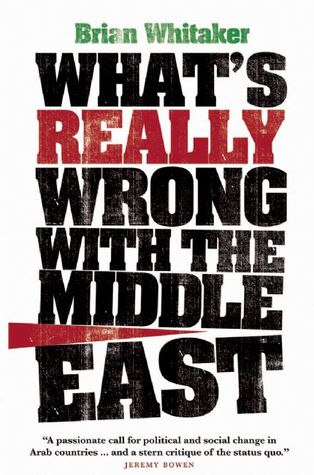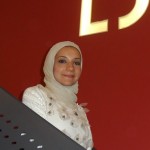by Heba Elsayed
This is a book review of Brian Whitaker‘s What’s Really Wrong in the Middle East published by Saqi Books in 2009. Brian Whitaker is a former Middle East editor of the Guardian. He is also the author of Unspeakable Love: Gay and Lesbian Life in the Middle East (Saqi, 2011).

As the first sparks of the ‘Arab Spring’ were ignited in Tunisia in late 2010, much of the Arab world was consequently swept with the optimistic gloss of the democratic dream. In an unprecedented expression of unity, a region of the world notorious for its sectarian, ethnic and religious cleavages, and deep class polarization, was finally united around three common demands: bread, freedom and social justice. However, almost three years, ongoing political chaos, multiple counter-revolutions and a military coup later, bread is still scarce, while freedom and social justice appear to be as unattainable as ever. So other than the disposition of several dictators and breaking citizens’ fear barrier, did the ‘Arab Spring’ really address the region’s most deep-rooted social ills? A first step towards answering this question is in reading Brian Whitaker’s fascinating account of What’s Really Wrong With the Middle East. With the wisdom of hindsight, books and publications will certainly race to offer an ‘it was so obvious’ account of why a region-wide uprising may have so far failed to deliver on its very hopeful promise of change. Yet, writing in 2009, with absolutely no indication that months later a mass uprising would permanently re-write Arab history, Whitaker boldly and often provocatively asks all the questions many have silently pondered, yet few (especially Arabs) have dared to openly ask.
In the opening chapter of the book, the author argues that ridding the Arab world of corrupt leaders will do very little to rid the Arab people of a culture and ways of life saturated in corruption. Such a statement succinctly captures what has largely been ignored over the last three years: change must come from within before it is imposed above. That Arab people are victims of autocratic, repressive and highly authoritarian regimes is a fact that Whitaker embraces and demonstrates eloquently across nine detailed and thought-provoking chapters. Yet, not shy to turn the tables, Whitaker recognises that Arabs are not only victims of tyrannical dictators; they are often propagators of cruelty and tyranny as much as they are on the receiving end of it. From Egypt to Sudan to Morocco to Syria, the author compellingly documents how Arabs have fallen prey to their own self-made ‘system of oppression’ (p.11), which in many cases, has transformed them from victims into victimisers. Embarking from this very honest premise, each chapter of the book deals with a major problem characterising both Arab regimes and households, including: lack of adequate education; absolute state repression; religious dogmatism; nepotism; a controlled media and lack of political freedom; and severe social discrimination.
An important strength of the book is that Whitaker avoids positioning himself as some sort of detached OrientalIst observer with an inquisitive interest in the region. The type of detail and contemplation he writes with is indicative of both profound first-hand experience of the Arab world as well as extensive research captured in the government documents, statistics, civil-society reports and expert interviews he draws on. Furthermore, participant quotations from Arabs of all backgrounds − taxi drivers, students, media professionals, government employees and ordinary citizens − give them much-needed space to tell their own tales. However, if giving a voice to Arab people is a strength of the book, then selectivity in relation to which voices to include is often a weakness. Although Whitaker takes a balanced and thoughtful approach in his commentary on most issues related to the region, when he turns to the discussion on Islam’s role within the Arab world, the author often seems to be clouded by his own assumptions about religion. In Chapter Four, Whitaker offers an interesting and well-documented account of how religious dogmatism is integral to the stifling authoritarianism that not only pervades the discourses of Arab regimes, but also extends to Arab schools, homes and mosques. However, reducing the role of religion in the Arab world to an ‘opium’ that allows the poor masses to be complacent of their disadvantaged social position; an extremist and overbearing discourse used by Islamists to demonise and often kill their opponents; or a blind reactionary position to the infiltration of ‘western’ inspired lifestyles, seems to overlook the daily importance of an Islamic identity to the moderate, often ‘westernized’ middle classes.
Whitaker’s comment that secularism is ‘the only outcome that can provide real freedom’ in the Middle East (p.136) reflects his own presumptions regarding religion, and is thus strongly revealing of why he chooses to use extreme and often unusual examples to capture the (mainly negative) role of faith in the lives of Arabs. Furthermore, the author’s prediction that secularism is a ‘likely outcome’ (p.136) in the Middle East indicates a hasty conclusion on his behalf, as only two years after his writing, Islamic-dominated governments have triumphed in what we can only assume are the region’s first free and fair elections. However, the dismal and often questionable performance of these governments suggests that what is urgently needed is a constructive reconsideration of Islam’s role in politics, and open debate on the position of sharia in modern democratic states. Whitaker touches upon this briefly towards the end of Chapter Four.
In societies routinely exposed to centralised media platforms riddled with empty self-praise and crude propaganda about ‘national unity,’ the type of candid reflection offered by Whitaker may be brutal for many Arabs. Yet, only by looking inwards with a readiness to be honest and self-critical can Arabs begin to understand why democratic transition in the region has faced − and will continue to face − formidable challenges. As an Arab, I am aware of how we are too willing to throw our lack of development and stagnation on the shoulders of either dictatorial leaders, or an external ‘western enemy’ driven by a politico-religious conspiracy to keep the region weak. Although this may be true to an extent, by playing the role of obedient students, we have willingly co-opted in any ‘plan’ to keep us in a feeble state. Thus, Arabs have often been the biggest enemies to themselves. For those ready to accept this, Brian Whitaker’s What’s Really Wrong with the Middle East is a great place to start!
 Heba Elsayed completed her PhD at LSE, department of media and communications, in 2012. Her research involved a comparative analysis of the ways in which young Egyptians from three different class backgrounds use the media as tools of identity construction. Heba is now a Research Fellow at the University of Oxford and has been conducting audience-based media research with a local NGO in Cairo to investigate how social media can be used by underprivileged youth as tools of self-development and education.
Heba Elsayed completed her PhD at LSE, department of media and communications, in 2012. Her research involved a comparative analysis of the ways in which young Egyptians from three different class backgrounds use the media as tools of identity construction. Heba is now a Research Fellow at the University of Oxford and has been conducting audience-based media research with a local NGO in Cairo to investigate how social media can be used by underprivileged youth as tools of self-development and education.





